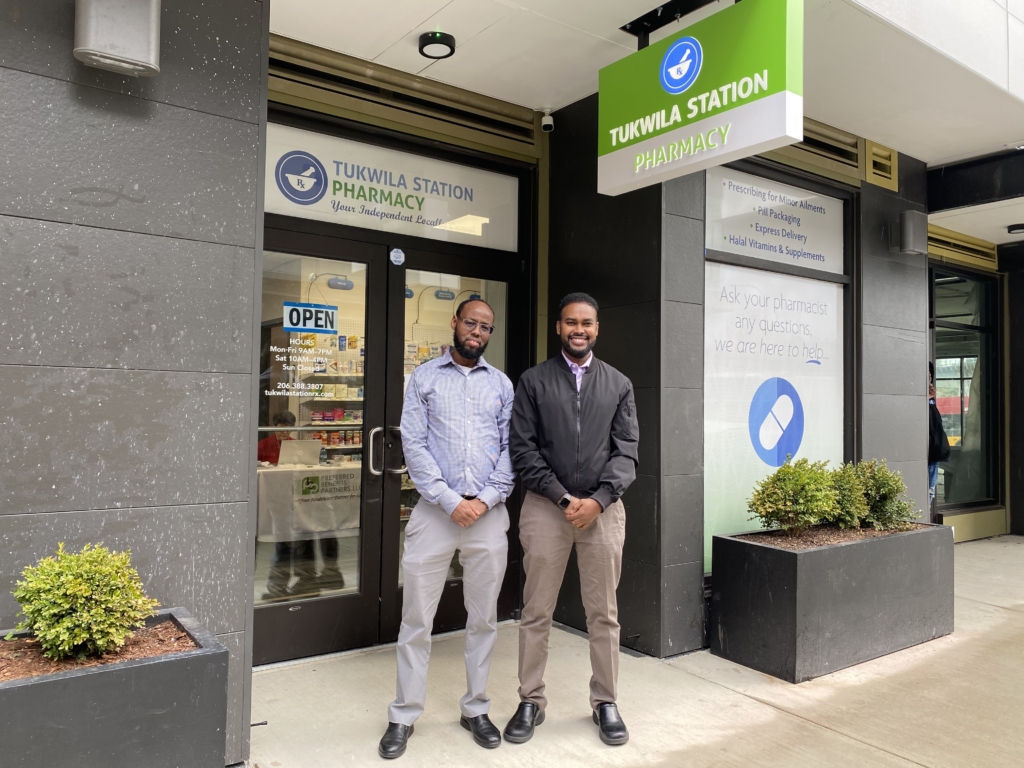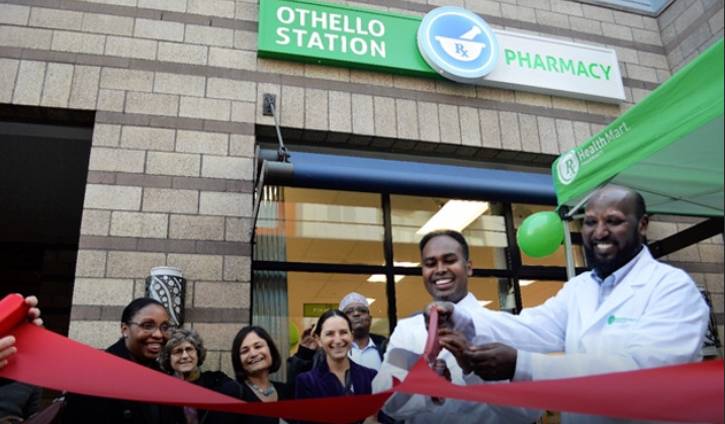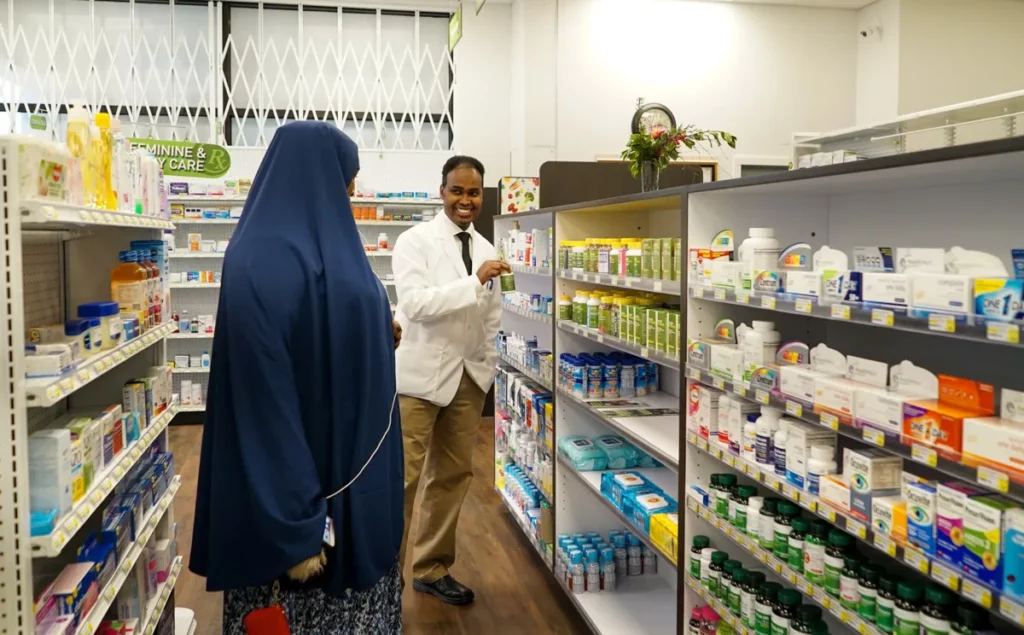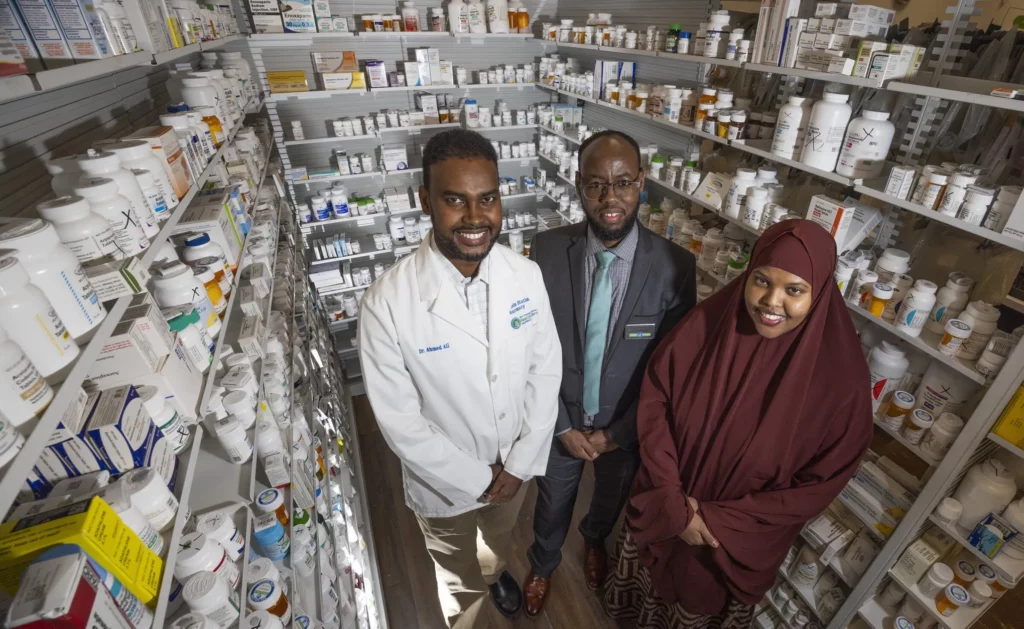
Tukwila Station Pharmacy co-owners Abdi Athur (left), and Ahmed Ali (right) outside their brand new business in Sea-Tac.
Meet Ahmed Ali and Abdi Athur, co-owners of Tukwila Station Pharmacy in SeaTac.
Ahmed Ali is the owner of independently-owned Othello Station Pharmacy, and teamed up with fellow pharmacist Abdi Athur to open a sister location in SeaTac. We talk about their journeys as refugees, why they chose pharmacy, and why independent pharmacies are so crucial to our communities.
This interview has been edited for length and clarity.
Where did you grow up?
Ahmed: My family and I moved here from Somalia in 1998 and my first business, Othello Station Pharmacy, is located in Southeast Seattle where we came in as refugees in 1998. I went to Ingram High School, then went to Washington State University for my undergraduate and doctorate in pharmacy, came back to Seattle to practice pharmacy, worked in pharmacy big chains, and managed there for a couple of years before opening my own business.
Abdi: I grew up in a refugee camp in Kenya, and then I got a scholarship to go to Canada. So I went to the University of Saskatchewan, and then after graduation, I went to practice pharmacy in Alberta. After working for about five years, I came to the United States, and had to restart everything, internships, exams, English language exams. But I finally became a pharmacist in the United States and have been for about five years here, So a total of about ten years.
Ahmed, Did you have family or an established Somali community when you came here?
Ahmed: No, we didn’t know anybody. I had no idea where Seattle was. When you’re in the refugee camp, they determine, “okay, well, you are gonna go somewhere called the USA and you’re gonna go to a place called Washington and also a place called Seattle.” So you show up, the language is different, the culture is different, and you find your way out.
I was a kid at that time, so it was easier for me to navigate through all the processes and to make friends. And, but it’s a completely different world that you’re immersed in. I enjoyed high school and just being an active kid, but it’s not easy, just completely shifting from your whole dynamics of how you knew the world, and you come here and now it’s completely different.

Ahmed opening Othello Station Pharmacy in 2018, in the neighborhood he grew up in.
What would your advice be to an immigrant coming to American navigating these changes?
Ahmed: You know, I tell my kids and other young kids the same thing that I would share with other folks which is: nothing is given in anywhere around the world, right? You have to work hard for it. But at the same time, if there’s any place on this earth that you can come with absolutely nothing, but if you have the right mindset and you work hard and you can make it, it’s here in the United States.
So you just have to know that you can, but you have to have the right attitude. You have to find partners that can work with you. You don’t box yourself in one place, and you find allies and friends that can walk you through that road.
I’ve always wanted to give back to the community that allowed me and my family to come here as refugees with nothing.
Why did you choose pharmacy and what did you find rewarding about it?
Ahmed: I’ve always wanted to give back to the community that allowed me and my family to come here as refugees with nothing, and be part of the process of making sure that we address health issues within the community. And the easiest way to do that is to bring something different than what they are accustomed to in terms of pharmacy delivery. So decided that we would open the first location in Othello has been open for the last five years, and happens to be one of the only Black-owned independent pharmacies in Washington State. So we’re excited to expand our second location here in South King County in Tukwila and Sea-Tac area, serving a very large diverse population.
Abdi: I didn’t even know what the role of a pharmacist was until I came to Canada. My friend recommended that engineering was a good field, so I thought that was a good choice, I was applied into engineering, got accepted, and was going to start the next year. And at that very time, my gut feeling was telling me that I was not making the right choice.
So when I was in Canada one day, I had a little bit of redness in my eye, and then I went to a nearby store, which was an independent pharmacy. And about that time, I was struggling with my career choice. I’m just going through the shelves looking for an item, and I don’t know which one to pick. And then one nice lady who was a pharmacist comes over, and she asked me, “May I help you? Do you need any assistance? I see that you have been here for a little bit.” I said, “Yeah, I really need some help.” She actually took the time, explained things to me, helped me out, and picked the right product for me. And that night, I was really happy. I was like, wow, this lady seems to be genuinely caring about me. I want to be like her. So I looked into it, what pharmacists do, and how pharmacists work, and everything. And that night, something was planted in me.
So I told my friend, “I want to become a pharmacist. I’m not going to do engineering, this is what I want to be, and I know how tough it is to get in because I’ve done the research, but this is what I want to do.” He looked at me in the eye, and he said, “I see you, you will be a pharmacist.”

Personalized service is what sets independent pharmacies apart. Photo Credit: South Seattle Emerald
What made you want to go independent, versus working for an established chain?
Ahmed: So I think in most cases, pharmacists go to pharmacy school because they care about patients. That’s the number one goal for pursuing that career in the health field. When they’re put in certain places, like the big chains, the dynamic changes. It’s more about numbers and making sure more people are getting prescriptions. So it diminishes all of that education that someone had, the clinical skills that they had, interpersonal relationships that they learn in school.
And what we’re seeing right now is a tipping point where big chains and the model that they had is not working.
The relationship between the patient and the pharmacist is very minimal, if it exists at all. And that’s why I, myself, my business partners, and a lot of pharmacists decided that we want to practice pharmacy the way we were taught in school, the way we had passion for it.
Abdi: Independents have built this reputation whereby when chains are actually cutting hours and trying to emphasize on metrics and volume, we are focusing on service and that’s where we compete. That’s where nobody can beat independents.
We don’t restrict ourselves to the four corners of the pharmacy.
How did the two of you meet and become business partners?
Abdi: I started with Bartell’s as soon as I came from Canada. Ahmed and I didn’t know each other, but because we’re in the same neighborhood and both pharmacists, once in a while they would call out for a prescription transfer, and we would talk on the phone. They’re also noticing that I’m doing something good at this location, because it used to be high turnover, and now it’s not. I was also recognized and given recognition in front of my peers, and then from there, I was nominated for a prestigious residency program, which was like one of the 11 residents from the whole U.S., for three months.
So I was basically selected to go ahead and further my career with Bartell’s and become the next leader. But while I was in that program, Ahmed had some plans for another pharmacy, and deep inside me, I also had this entrepreneurial spirit. I wanted to one day own a business. So when Ahmed reached out to me and said, “Hey, this is the plan that I have, and you already have a relationship with this area, are we able to team up? What do you think?” I said, “That’s a great idea. This is always an opportunity that I’ve been thinking about doing on my own, and you have the experience. I’m not going to say no, because I know what you have built at the Othello Station pharmacy, I know the reputations that I see online and how people are praising that location, so why not? I’m 100% going to team up with you guys.”
When I was resigning, I was actually offered a promotion, so I thought about it for a few days. But I said no, and luckily I said that, because I wouldn’t be here without it. I can do all of those things, the career development, while I’m still with this company. And growing from this, I would say that the career is going to be bright for all of us.

Ahmed Ali, Abdi Athur, and Farhia Ara inside the new Tukwila Station Pharmacy. Photo Credit: Seattle Times
So what are some other small ways that you kind of differentiate yourself from like the chain having worked in one?
Ahmed: So, you know, in Big Chains, you get medication, you take it, you go home and that’s it. But for us, we have a follow-up system that we typically do. You know, we go to our seniors’ homes initially when they get the transfer prescriptions to us. We make the effort to go there, to talk to them, make sure that whatever the doctor’s prescribing is what they actually take. You’d be surprised how many people have in their medicine cabinet things for the last five, six years that they don’t even use. It’s there, or sometimes they take it by mistake.
We have installed a disposal kiosk at our pharmacy in Othello that anyone who has medication that they don’t need to use can dispose of. We also do a bubble packing for some of the seniors if they have dementia or if they’re forgetful. We also have a delivery system that is real-time, not mail order, not Amazon, but individuals who we hired from the community that actually pick up medication from the pharmacy, go into their homes, and give it to them in person. And if they have a question, they can talk to their pharmacist as well, right there and then.
I think the convenience is another one. And when I talk about convenience, I mean, you’re not gonna be standing in line for an hour, two hours sometimes. And when you get to the line, you’re told, “we don’t have your medication ready”, or “come back half an hour later”, or “it’s out of stock, we don’t have it, come back another day.”
I think for us, it’s pretty simple. We text you when the prescription is ready, or we’ll bring it to your own home if need be. If something is out of stock and we don’t have it, we notify our patients in advance if they’re coming by to us. So we take a lot of effort to make sure that we’re not inconveniencing folks. And I think that has sort of changed how people perceive delivery in terms of medication access. We don’t have anyone that’s staying here more than five minutes.
We try to go above and beyond to make sure that we are doing things that are different.
We know your team speaks a variety of languages, is that right?
Ahmed: Yes. In the Othello location, we have a good size of employees there. And we intentionally make sure that the demographics that we serve, if someone comes in and they cannot communicate English proficiently, then someone that can speak their language.
We have staff that speak Somali, Oromo, some that speak Amharic and Tigrayan, Swahili, Tagalog. And also we had staff that speak other languages, for about seven or eight different languages as well. And we make it intentional that everybody speaks English, but not everybody understands English when we talk about medical terms, right? So it makes it easier for someone to call on the phone and say, hey, this is what I’m looking for and be able to have someone that speaks their language.
And along with that, there are some languages which we know we can fulfill. King County is very diverse, so if someone speaks Dari or Farsi from Afghanistan or even Vietnamese, we can put the prescription label in different languages as well, if need be.
Why do you feel it’s important that people spend intentionally and support Black-owned businesses?
Ahmed: When we talk about, in general, Black-owned business, I think we’re wrapping up to all, you know, African and African-Americans. And I think the struggles are a bit different when it comes to African-American born here and the African immigrant myself.
And so we have to kind of put those things in different contexts. And while we’re all Black and we all have the same economic struggles, institutional racism, structural racism, and all of that has, you know, manifested into itself, into so many things that has led to what it is right now where we’re talking about only Black-owned, independent pharma. Sometimes when I mention that, I cringe, myself.
It’s not easy, it’s very difficult. Even getting a lease in our first location, our lease was one of the worst ones we could ever get in comparison to other folks who got the same space and per square footage.
And that’s because no one’s gonna trust that you’re gonna survive. No one is gonna trust that you can actually maintain the business. But, you know, I think we understand that the world that we live in, and therefore we just have to work twice as hard.
We have to work three times as hard and put more effort. It’s the same thing with opening the second location. The tenant improvements that you’re getting reimbursed are different than when a corporation negotiates the same space.
I think any individual that’s Black that’s interested in getting into ownership of business, should go into it. But at the same time, there’s a huge hill to climb. It’s unfortunate, but it’s just the way the system is set up.
But I think on the flip side, there is a lot of support out there. There are a lot of friends that we have that are not Black who are supporting us in making sure that that system is dismantled, at least to make sure that there’s a support that goes into that. So I think for me and my partners, we’re very lucky to not look at it from a black and white kind of perspective, but we look at this as, hey, this is an American experience.
This country is built on immigrants. They might have come generations apart. We are the recent ones who are showing up here, but I think for us, it’s more or less, okay, we’re gonna do this regardless what it takes us and we’re gonna succeed at it.
Abdi, how do you like Seattle since you’ve moved?
Abdi: Seattle is a beautiful city, with a lot of opportunities. I cannot thank enough for the opportunities that I’ve had to build connections and great relationships with people, especially health care people. Especially for the time that I’ve been working with Bartell’s, I floated around and managed at almost all of the stores. And then working for Rite Aid as well, I was in charge of 22 stores. And that’s when I learned that this state is very beautiful. It’s very beautiful in Washington State. I traveled around to the peninsulas, North, East. And we also have gone hiking with my friends and Ahmed.
Beautiful sceneries. So I’m very glad to be here in this state. It’s so beautiful.

Ahmed and Abdi really care about health and helping their community at their pharmacy. They focus on giving personal care and making sure patients come first. It’s inspiring to see how they came from being immigrants to owning a successful business. Here’s to their ongoing success in helping the community!
https://www.technobridge.in/training/clinical-research/top-10-pharmacovigilance-training-institutes-in-india